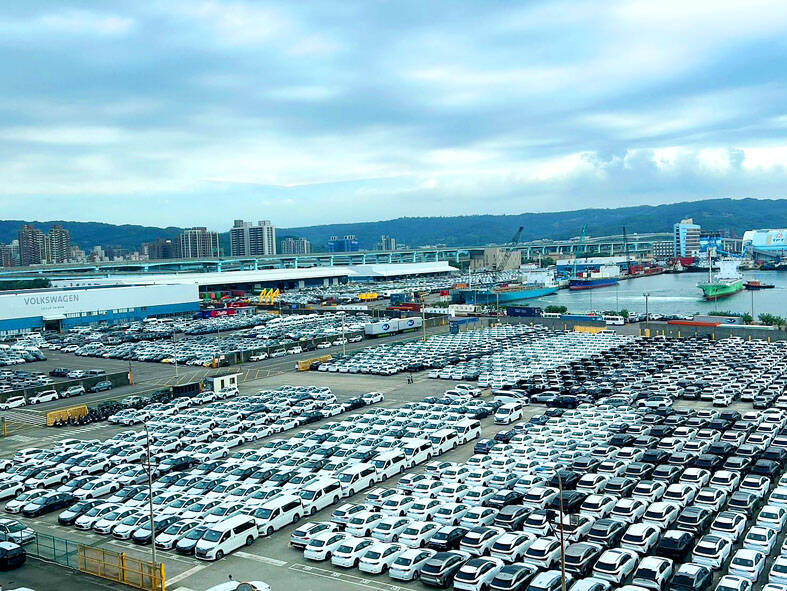Sales in the retail sector last month decreased 2.9 percent year-on-year to NT$390 billion (US$13.3 billion), government data released yesterday showed, as consumers remained cautious amid lingering uncertainty over US tariff policy and local currency volatility.
Last month’s decrease was the third consecutive month of declines, data released by the Ministry of Economic Affairs showed.
However, it met the ministry’s forecast of an annual decrease of 0.4 to 3.4 percent, with sales expected to be between NT$387.6 billion and NT$399.7 billion.

Photo courtesy of a reader
The weakness was mainly driven by a decline in vehicle sales, as the delivery of some imported vehicles was delayed due to customers awaiting the outcome of Taiwan’s tariff negotiations with the US.
Sales of cars, motorcycles, auto parts and accessories fell 17.3 percent year-on-year to NT$71.6 billion last month, the ministry said in a report.
In addition, fewer holidays last month led to a 6.3 percent decrease in fabric and clothing sales to NT$26.4 billion, while some department stores were remodeling their floors, resulting in a 3.6 percent sales decline to NT$31.9 billion, the report said.
However, healthy spending continued at e-commerce sites, supermarkets, convenience stores, hypermarkets, and information and communications device stores, it said.
Overall, retail sales in the second quarter fell 1.6 percent year-on-year to NT$1.17 trillion and were down 0.4 percent to NT$2.37 trillion in the first half of this year from the same period last year, ministry data showed.
The report also revealed that sales in the food and beverage sector last month dropped 2 percent annually to NT$85.3 billion, ending three consecutive months of increases and missing the ministry’s forecast of an annual increase of 1.2 to 4.2 percent, which ranged from NT$88 billion to NT$90.7 billion.
The ministry attributed this decline to a 3.6 percent drop in restaurant sales to NT$67.5 billion due to a high comparison base last year and some businesses temporarily suspending operations for renovations.
Yet consumers did not cut spending on beverages, with sales rising 2.6 percent to NT$11.5 billion, while robust demand for in-flight meals amid a travel boom also contributed to an 8.4 percent sales increase for catering service providers, reaching NT$6.2 billion, the report said.
Food and beverage sales rose 2.2 percent year-on-year to NT$257.2 billion in the second quarter, a record for the same period, and increased 3 percent to NT$531.4 billion in the first half of the year, also a record high, it said.
For this month, the ministry projected that retail sales would show an annual decline of 2 percent to an annual increase of 1 percent, reaching NT$394.9 billion to NT$406.9 billion, while food and beverage sales are expected to grow 1.3 to 4.3 percent to NT$85.9 billion to NT$88.4 billion.

When Lika Megreladze was a child, life in her native western Georgian region of Guria revolved around tea. Her mother worked for decades as a scientist at the Soviet Union’s Institute of Tea and Subtropical Crops in the village of Anaseuli, Georgia, perfecting cultivation methods for a Georgian tea industry that supplied the bulk of the vast communist state’s brews. “When I was a child, this was only my mum’s workplace. Only later I realized that it was something big,” she said. Now, the institute lies abandoned. Yellowed papers are strewn around its decaying corridors, and a statue of Soviet founder Vladimir Lenin

UNIFYING OPPOSITION: Numerous companies have registered complaints over the potential levies, bringing together rival automakers in voicing their reservations US President Donald Trump is readying plans for industry-specific tariffs to kick in alongside his country-by-country duties in two weeks, ramping up his push to reshape the US’ standing in the global trading system by penalizing purchases from abroad. Administration officials could release details of Trump’s planned 50 percent duty on copper in the days before they are set to take effect on Friday next week, a person familiar with the matter said. That is the same date Trump’s “reciprocal” levies on products from more than 100 nations are slated to begin. Trump on Tuesday said that he is likely to impose tariffs

HELPING HAND: Approving the sale of H20s could give China the edge it needs to capture market share and become the global standard, a US representative said The US President Donald Trump administration’s decision allowing Nvidia Corp to resume shipments of its H20 artificial intelligence (AI) chips to China risks bolstering Beijing’s military capabilities and expanding its capacity to compete with the US, the head of the US House Select Committee on Strategic Competition Between the United States and the Chinese Communist Party said. “The H20, which is a cost-effective and powerful AI inference chip, far surpasses China’s indigenous capability and would therefore provide a substantial increase to China’s AI development,” committee chairman John Moolenaar, a Michigan Republican, said on Friday in a letter to US Secretary of

Taiwan Semiconductor Manufacturing Co’s (TSMC, 台積電) market value closed above US$1 trillion for the first time in Taipei last week, with a raised sales forecast driven by robust artificial intelligence (AI) demand. TSMC saw its Taiwanese shares climb to a record high on Friday, a near 50 percent rise from an April low. That has made it the first Asian stock worth more than US$1 trillion, since PetroChina Co (中國石油天然氣) briefly reached the milestone in 2007. As investors turned calm after their aggressive buying on Friday, amid optimism over the chipmaker’s business outlook, TSMC lost 0.43 percent to close at NT$1,150